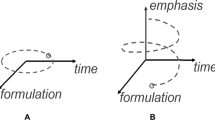Abstract
Although behavior therapies are putatively based on traditional learning paradigms, standard clinical practice with outpatient clients presenting problems of personal adjustment routinely requires a voluntary commitment to collaboration (CTC) with the therapist (Harcum, Burijon, & Watson, 1988). Nevertheless, in the various summaries of the theoretical justification, even for cognitive behavior therapy, the mainstream literature generally omits this presumably necessary humanistic component and includes only acceptable principles from traditional learning paradigms. Development of a comprehensive theory of behavior therapy is prevented by this failure to acknowledge the need for a theoretical justification of CTC. This avoidance is attributed to a fear of being considered unscientifiC., fostered by traditional graduate training in psychology.
Similar content being viewed by others
References
AGRAS, W. S., KAZDIN, A. E., & WILSON, G. T. (1979). Behavior therapy. San Francisco: W. H. Freeman.
BANDURA, A. (1982). Self-efficacy mechanism in human agency. American Psychologist, 37, 122–147.
Behavior Research and Therapy. (1987). 25(3), (inside back cover).
EPSTEIN, L. H., & WING, R. R. (1984). Behavioral contracting: Health behaviors. In C. M. Franks (Ed.), New developments in behavior therapy: From research to clinical application (pp. 409–449). New York: Haworth Press.
ERICKSON, R. C. (1973). “Free will” and clinical research. Psychotherapy: Theory Research, and Practice, 10, 10–13.
Eysenck, H. J. (1964). The nature of behavior therapy. In H. J. Eysenck (Ed.), Experiments in behavior therapy (pp. 1–15). Oxford: Pergamon Press.
FRANKS, C. M., & BRADY, J. P. (1970). Editorial: What is Behavior Therapy and why a new Journal? Behavior Therapy, 1, 1–3.
FREEMAN, A. (1987). Cognitive therapy: An overview. In A. Fromm & V. B. Greenwood (Eds.), Cognitive therapy (pp. 13–35). New York: Human Sciences Press.
GLASSER, W. (1965). Reality therapy. New York: Harper and Row.
GREENWALD, H. (1973). Decision therapy. New York: Peter H. Wyden.
HARCUM, E. R. (1975). Serial learning and paralearning. New York: Wiley-Interscience.
HARCUM, E. R. (1988). Defensive reactance of psychologists to a metaphysical foundation for integrating different psychologies. The Journal of Psychology, 122, 217–235.
HARCUM, E. R. (1989). Commitment to collaboration as a prerequisite for existential commonality in psychotherapy. Psychotherapy, 26, 200–209.
HARCUM, E. R., BURIJON, B. N., & WATSON, N. (1988). Client responsibility in the practitioners’ operational definition of behavior therapy. Journal of Human Behavior and Learning, 25, 41–43.
HARDING, J. (1976). Behavioristic and humanistic approaches: Compatible or incompatible. In A. Wandersman, P. Poppen, & D. Ricks (Eds.), Humanism and behaviorism: Dialogue and growth (pp. 193–206). Oxford: Pergamon Press.
HAYES, S. C. (1984). But whose behaviorism is it? Contemporary Psychology, 29, 203–206.
Information for authors. (1987). Behavior Therapy, 18(2), (inside back cover).
KANFER, F. H., & HAGERMAN, S. M. (1985). Behavior therapy and the information-processing paradigm. In S. Reiss & R. R. Bootzin (Eds.), Theoretical issues in behavior therapy (pp. 3–33). Orlando: Academic Press.
KOCH, S. (1981). The nature and limits of psychological knowledge: Lessons of a century qua “Science.” American Psychologist, 36, 257–275.
Lichtenstein, P. E. (1984). Interbehaviorism in psychology and in the philosophy of science. The Psychological Record, 34, 455–475.
LOCKE, E. A. (1971). Is “behavior therapy” behavioristic? Psychological Bulletin, 76, 318–327.
MAHONEY, M. J. (1985). Psychotherapy and human change processes. In M. J. Mahoney & A. Freeman (Eds.), Cognition and psychotherapy (pp. 3–48). New York: Plenum Press.
MASLOW, A. H. (1965). Humanistic science and transcendent experiences. Journal of Humanistic Psychology, 5, 219–227.
MASTERS, J. C., BURISH, T. G., HOLLON, S. D., & RIMM, D. C. (1987). Behavior therapy: Techniques and empirical findings (3rd ed.). San Diego: Harcourt Brace Jovanovitch.
O’HARA, M. (1986). Comment on Carl Roger’s “Toward a more human science of the person.” Journal of Humanistic Psychology, 25, 25–30.
PAPAJOHN, J. C. (1982). Intensive behavior therapy. New York: Pergamon Press.
POLKINGHORNE, D. (1983). Methodology for the human sciences: Systems of inquiry. Albany: State University of New York Press.
PROCHASKA, J. O., & Dl ClEMENTE, C. C. (1986). In W. R. Miller & Nick Heather (Eds.), Treating addictive behaviors (pp. 3–27). New York: Plenum Publishing Corporation.
RICKS, D. F., & FLEMING, P. (1976). Humanistic and behavioral approaches from a life history perspective. In A. Wandersman, P. Poppen, & D. Ricks (Eds.) Humanism and behaviorism: Dialogue and growth (pp. 269–287). Oxford: Pergamon Press.
RICKS, D. F., WANDERSMAN, A., & POPPEN, P. J. (1976). Humanism and behaviorism: Toward new syntheses. In A. Wandersman, P. J. Poppen, & D. F. Ricks (Eds.), Humanism and behaviorism: Dialogue and growth (pp. 383–402). Oxford: Pergamon Press.
ROGERS, C. R., & SKINNER, B. F. (1956). Some issues concerning the control of human behavior: A symposium. Science, 124, 1057–1066.
RUBEN, D. H. (1986). The “interbehavioral” approach to treatment. Journal of Contemporary Psychology, 16, 62–71.
RYCHLAK, J. F. (1984). Newtonianism and the professional responsibility of psychologists: Who speaks for humanity? Professional Psychology: Research and Practice, 15, 82–95.
SMITH, N. W. (1984). Fundamentals of interbehavioral psychology. The Psychological Record, 34, 479–494.
STAATS, A. W. (1981). Paradigmatic behaviorism: Unified theory construction methods, and the Zeitgeist of separatism. American Psychologist, 36, 239–256.
WILSON, G. T., & O’LEARY, K. D. (1980). Principles of behavior therapy. Englewood Cliffs, New Jersey: Prentice-Hall.
YALOM, I. D. (1980). Existential psychotherapy. New York: Basic Books.
ZIMMERMAN, D. W. (1984). A note on the completeness of the scientific method. The Psychological Record, 34, 175–179.
Author information
Authors and Affiliations
Rights and permissions
About this article
Cite this article
Harcum, E.R., Burijon, B.N. & Watson, N. Need for a Theoretical Justification of Humanistic Commitment Components in Behavior Therapy. Psychol Rec 39, 493–500 (1989). https://doi.org/10.1007/BF03395077
Published:
Issue Date:
DOI: https://doi.org/10.1007/BF03395077




